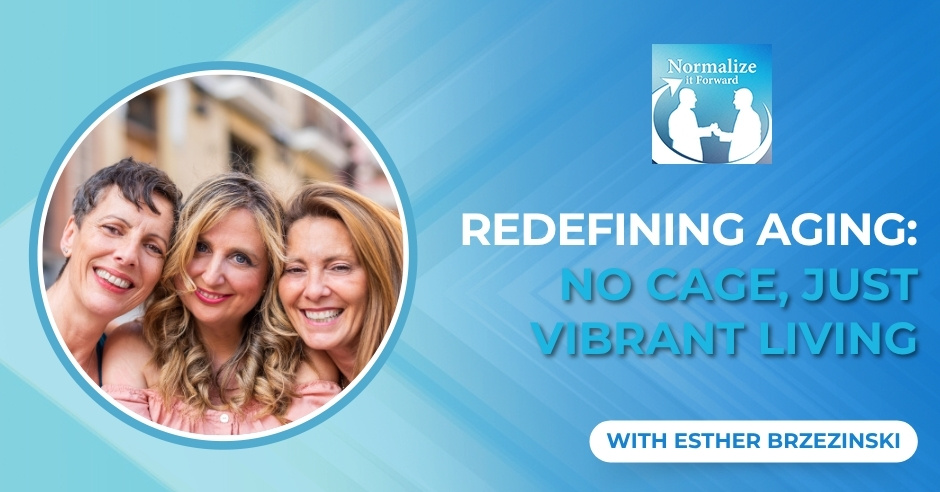
Redefining aging is about sparking joy and embracing every moment with infectious enthusiasm! This episode shines with the vibrant energy of Esther Brzezinski, a multi-talented actor, voiceover artist, and digital creator who’s showing the world that “Age is not my cage!” Hailing from Montreal, Esther’s got a booming online community—over 150,000 on TikTok and 110,000 on Instagram—all drawn to her authentic zest for life and message of positive aging. She’s not just lighting up social media; you’ll find her on screen in projects like “Jurnee’s Revenge” and “Goin’ Ape 2” and behind the mic producing podcasts, including her own “Esther’s Breeze.” Get ready for a chat filled with laughter and insightful nuggets as Esther spills the tea on self-care from the inside out, her adventures in raising neurodiverse kids, and how she’s smashing stereotypes one viral video at a time. This is an episode packed with inspiration, good vibes, and a reminder that life just gets better with age!
Reading about mental health is hard. Let’s schedule a free consultation.
—
Watch the episode here
Listen to the podcast here
Redefining Aging: No Cage, Just Vibrant Living With Esther Brzezinski
We are here to talk openly about mental health and wellness. I’m super excited to welcome into the show Esther Brzezinski. Esther, how are you?
I am doing well. Thank you so much for having me.
Thanks for being here. Esther is a dynamic actor, voiceover artist, and content creator from Montreal, Canada. She is a champion of the motto ‘Age is not my cage’. Esther is redefining perceptions of aging through her empowering presence on social media, where she inspires over 150,000 followers on TikTok and 110,000 on Instagram.
Her acting portfolio includes notable projects such as Jurnee’s Revenge and Goin’ Ape 2, showcasing her versatility and talent in the entertainment world. Esther is also a podcast producer and host, further amplifying her voice to connect and uplift others. With her passion for breaking stereotypes and embracing positivity, Esther is the spirit of resilience and creativity, making her an inspiring guest to be here on the show. Welcome, Esther.
Empowered Aging: Redefining “Golden Years”
Thank you so much for that incredible introduction.
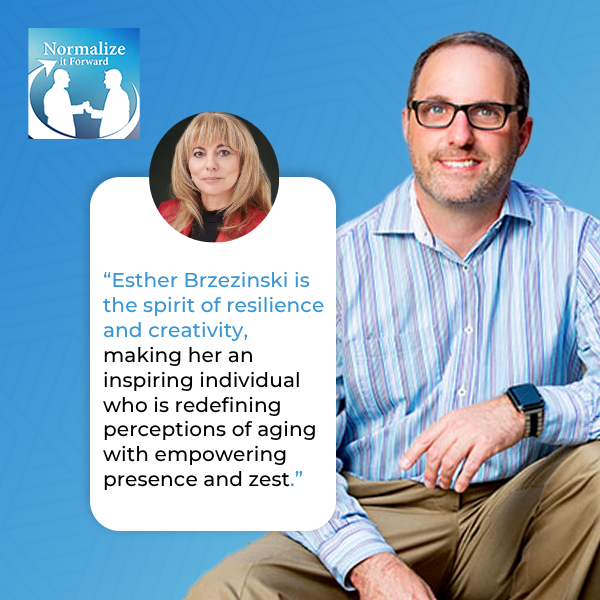
We’re excited to have you here. I would love to jump in and hear all about what you’re up to and what you’re doing.
I’m still very much involved with acting. I do a lot of short films, commercials, etc. I also do some voiceover work. I am working on another podcast. It has been a few years. I missed it. We’re working on it with three other women from different generations. It should be interesting. It’ll be a little different because it’ll be in a studio as opposed to where I was using StreamYard before, which was during the lockdown. That was what most people were using at the time. I’m looking forward to that as well. I am continuing with my content creation as always, talking about ageism, positive aging, etc. You’re right on. My motto is ‘Age is not my cage’.
I love that. It’s fantastic. I’m intrigued by your new podcast. Where can people find it? Do we know yet where it’s going to be?
It’ll probably start off on YouTube. We’re going to start recording in February 2025. We’re coming up with a concept. We did a mock one already. I’m very excited about that.
Brittany speaks very highly of you.
Thank you.
I’m excited to interview you, talk to you a little bit about wellness, and get a sense of your viewpoint and how you see the different areas of mental health and wellness. I created this show to give voice to the conversation and to hopefully talk more openly about topics. I love your spirit about ageism. It’s a parallel mission.
I was saying to someone that mental health is a tough topic to talk about. I’ve gotten a number of comments from families saying they’ve tuned in to our shows, some with their kids, and it has allowed them to have those conversations. I’m super grateful for that impact throughout our show. I want to jump in and get your thoughts on things, if I could. One of the topics that we tend to talk about a lot here is self-care. Self-care is a big buzz phrase in our world that people talk a lot about. I’m curious what self-care means to you.
Self-Care From Within: A Mindset Of Adventure
I believe self-care comes from the inside out. I care about what I eat. I probably don’t exercise as much as I should. On the other hand, for me, it’s also always been the mindset. I’ve always, I believe, had a young spirit. Though turning 60 was mildly traumatic, but not so much, it was very much how I feel about life. I felt that the best was yet to come. I felt like it was another chapter, maybe the final chapter, or maybe part three, if we’re going to divide it up into thirds, childhood, adulthood, and then the golden years. I saw it as an opportunity to do all the things I’ve always wanted to do.
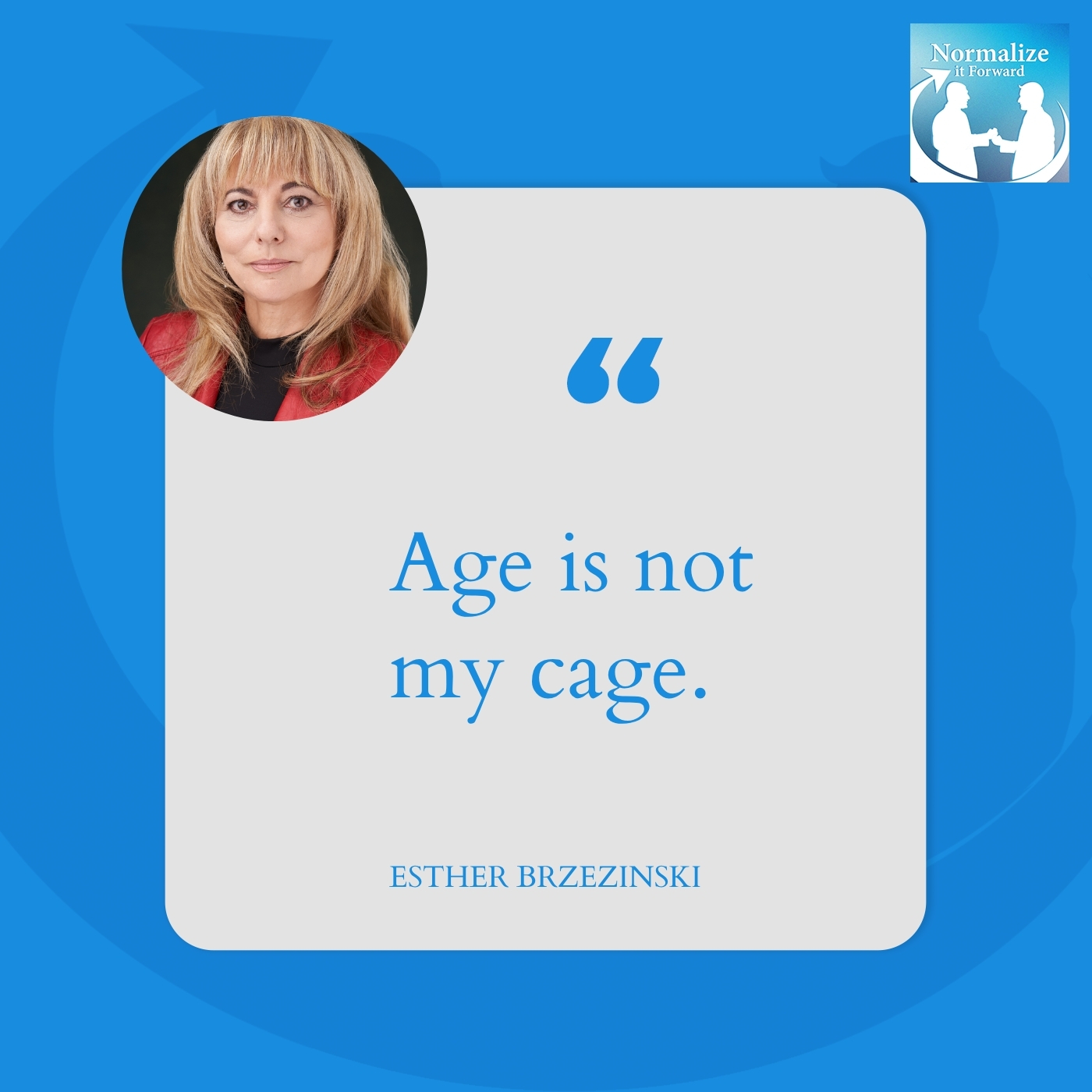
I do have one adult child who’s living at home with me. My other adult child has been married for many years. She’s going to have her second child. All that to say, I had more freedom. I was able to go out into the world and explore areas that I was not able to before, being a young mother and then having all the responsibilities. Turning 60, and then turning 65 and retiring, so to speak, gave me a lot of freedom. I was excited about the future. That has a lot to do with why I appear to be thriving and have a young-ish spirit. It’s because I’m excited. I get to do all the stuff I always wanted to do.
Good for you. Mindset is powerful. I’ve met people who are in their 30s who appear to be in their 80s. If COVID taught us some things, one of those things is that we can’t depend on our future, so enjoy today. Enjoy what you have right in front of you because tomorrow may not be here, or tomorrow might even be better. It’s unpredictable that way. Your mindset is huge, and what goes into that. A lot of people talk about what they do in terms of behaviors, eating, sleeping, exercise, and those types of things that allow them that mindset. How do you have such a positive mindset? What are some of the things that you do to contribute to that?
I like to get into new projects. I’m very interested in networking and meeting new people. I like to keep up with what’s going on in the world. I’m very enthralled and fascinated by social media. It’s an incredible tool. I love my iPhone. Maybe there’s a mild addiction there, but all that to say it inspires me. I feel excited every day to see what’s new, see what’s happening, and what I am going to explore and find out.
That’s awesome. I love the spirit. I love the spunk. I love the energy. That’s obvious, as we’re talking, that that’s part of your daily mantra. I’m curious. You mentioned your kids. I know they’re grown, but in some ways, kids are always kids, no matter how old they are. Parenting is a topic that also comes up a lot on our show. Parenting is such a wide topic.
A lot of times, parents have challenges that are unexpected. I often refer to parenting as the hardest on-the-job training a person will ever have. We’re getting older and transitioning one of them to their own families. I’m curious. In terms of parenting, how would you say wellness fits into that topic? Where do the two collide for you?
Parenting Challenges & Triumphs: Navigating Neurodiversity
Parenting is probably one of the most challenging things that I’ve ever experienced. It takes an incredible amount of strength, endurance, and understanding. I’m also going to explain that my son, who’s 33, is Neurodiverse. He’s on the spectrum of autism. That has always been a struggle. When we first discovered that he had different wiring, it was a huge transition as a parent to accept that.
There was a poem at the time that was very popular. It was called Welcome to Amsterdam. You’re on the plane. You think you’re going to France, and then it takes a detour and you end up in Amsterdam. It’s pretty wonderful in itself. Even though it’s not what you expected, you learn how to navigate in this new location. This is what it was like bringing up a child who was on the spectrum. There were a lot of challenges there.
My daughter, who is 36, has a cousin disorder. She deals with OCD. She’s a very functioning adult with OCD. Parenting, for me, was challenging. I often felt like I was running a clinic. Honest to God. That was how I would describe that experience. They’re doing extremely well. My daughter is amazing. As an adult, she still requires support from her parents. The relationship changes. We’re more friends than mother-daughter.
Since she’s having her second child, she’s going to be depending on me in the sense that she wants me there at the hospital, she wants me to help with the baby, etc. Having grandchildren has also been a very amazing experience in itself. It’s a different type of love. It’s more pure in some ways. It’s been an experience. I have one child who’s grown and married with children, and then I have another one who’s still at home and has some struggles. I’m still deep in parenting, so to speak. Even though I’m 67, I’m in parenting mode.
A lot of people thought that once you turn 60, it’s over. That it's not important anymore. You couldn't be further from the truth. Share on XI don’t know that it ever necessarily ends. It morphs into other things. Congratulations in advance. It sounds like a big day is coming for your daughter. I am wishing everybody well. What you said, I’m sure, resonates with a lot of our readers because many parents have kids who are either on the spectrum, are anxious, are depressed, or have OCD. I’ll have to look that poem up later. You’ve got me thinking about that. It sounds like an interesting topic.
Many parents have that experience of expecting this, and things shifted and changed as a result of those disorders. How does that impact the house? How does that impact your parenting? How does it impact your child? My guess is that a lot of my readers will have very similar thoughts and responses. That’ll resonate with them.
I appreciate you sharing that with us. I’m sure that came with a set of challenges that maybe you were unprepared for or not recognizing, but by itself, unique and special in developing their own paths. I’m pleased to hear that they’re both doing so well. I appreciate you sharing that with us. Out of curiosity, in terms of the topic of wellness, when you think about your kids growing, if a new mom or a new dad were to speak with you and say, “We feel like our son or our daughter has some impairments,” were there certain things you guys stumbled across that helped a lot?
I looked at it like I was going to do everything in my power to help my child, and then eventually, both children. I did a lot of research. It’s important to be extremely proactive. Though I depended on the medical system in some ways, I felt it wasn’t enough, and I had to delve deeper. For my son, I found an online program. He was part of the beta testing of it. It was Language Power Systems. I don’t know if it still exists. He became part of it. His language ability progressed one year ahead using this particular program.
This was something that my dad saw in the newspaper at the time when people still read newspapers. He cut out this little article that said something was happening at Rutgers University. They were developing this program. I contacted the researchers and then became part of the beta program. He also did it again a couple of years later. He has fantastic vocabulary, interestingly enough. He was language delayed, so it did help.
It is great to depend on whatever system you have going in your area, medical and whatnot, but be your own cheerleader for your child. Be proactive. You have to be super involved. Every school that he went to, we had to work with the teachers and the principals. We have to be very involved. That’s my experience and what I’d suggest.
It’s great advice. As a therapist, I’ve seen that, and I’ve seen the opposite with parents. It makes a huge difference. I am thrilled to hear that story about your son and how he advanced with his language skills. There’s so much out there that can help you as a parent and certainly help with the progression of whatever your child might be dealing with. There’s the power of the internet. There’s a lot out there, right?
Absolutely. This was in the ‘90s, so now there’s so much more.
Building Community: The Power Of Social Media
I’m curious. You had mentioned social media. I am on social media, too, for my business and other things. Social media has become integrated into our world in many ways. We’re advertised to it. Certainly, plenty of people use it for entertainment purposes. People have businesses on there, etc. I’m wondering. You talked about it in such a positive way earlier. When you think about the positive impact social media can have on both young people as well as parents, what comes to mind?
Community is the first thing that comes to mind. That’s what I discovered. The 50-plus community was there. Everything I spoke about resonated with people, and they weren’t necessarily creators themselves. Many were sitting back, watching, and engaging. It struck me how much people needed to hear what I had to say.
We inadvertently built a community. That’s the first thing, which is community, like-minded people, and similar interests. You could see that all over, even on Facebook. There are many communities on Facebook that have been very helpful, even in the acting world. When you’re starting out, there are many pages for whatever area you live in, looking for actors to be in independent films, etc. There’s a lot out there.
I feel like that word does capture it well, community. There’s a community for everybody and everything. That is one of the real positives that you get from social media. Those of you who are out there and haven’t experienced that, know that both Esther and I have. If you’re looking for support, that might be one area to consider. Certainly, I would say Facebook, Instagram, and TikTok, all three, offer that in spades. Often, we hear of all of the dangers associated with using them and all of the negativity associated with them, but we don’t hear about the positivity. I think there is a lot of positivity. I appreciate you throwing that word out. That captures it well.
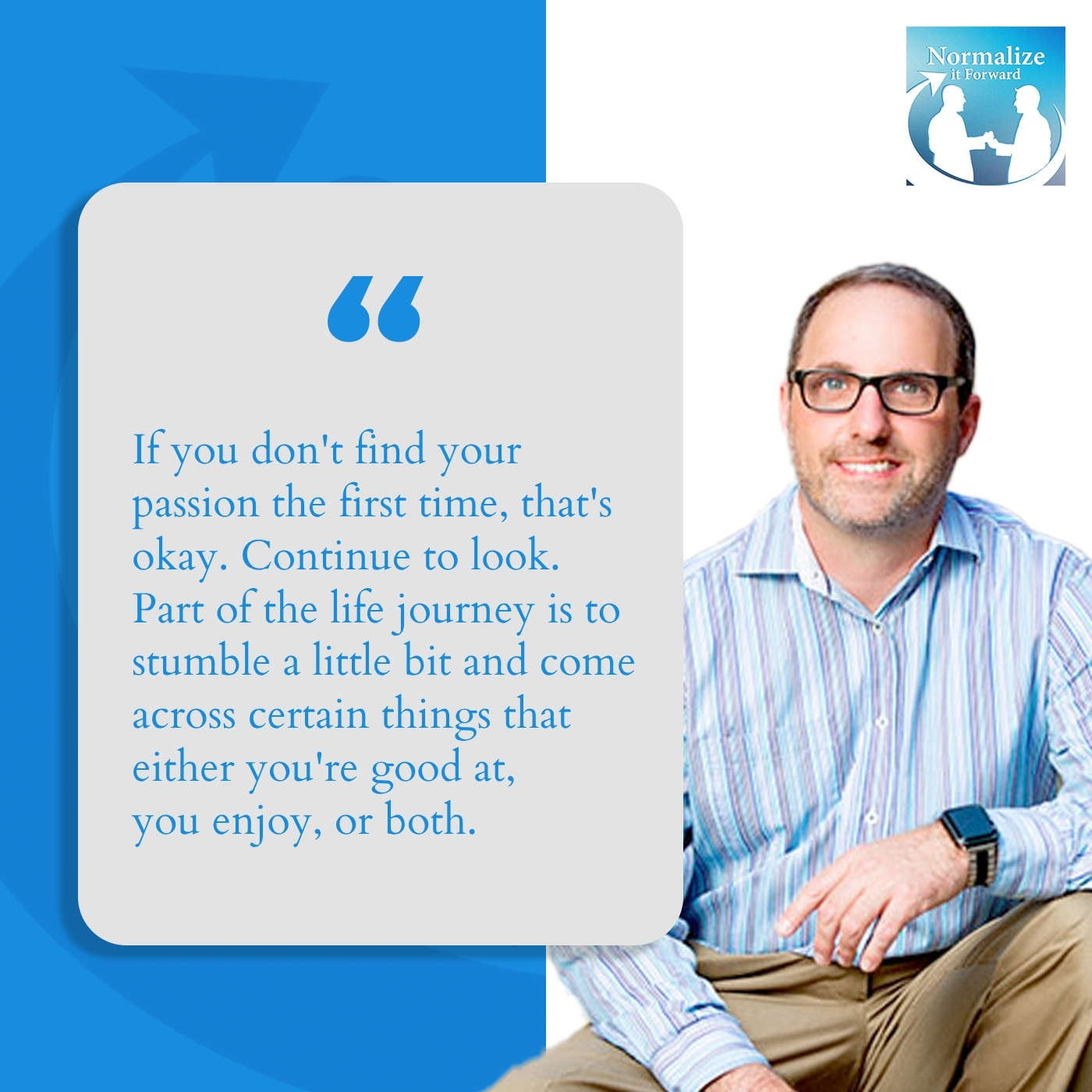
I’m happy to have done that.
Tell me. I’m curious. Your background’s interesting. I feel like everybody has a story or a journey. I’m wondering how your background and your journey develop. Can you give me a little bit of a sense of that?
A Journey Of Reinvention: From Psychology To TikTok Success
That’s an interesting question. I went all over the place. I have a degree in psychology. We’re going to go way back. I also have some post-graduate business courses. I ended up in the fashion industry. I did that for many years. I traveled. I was a buyer, a merchandiser, etc. I was always fascinated with psychology and understanding myself and others. It was the way that I was as a person. I was very analytical in trying to understand people. I often felt that I felt people. Maybe there’s an empath in me that I always had and didn’t understand.
After my son was born, I decided to stay home. I realized that he had some special needs, so I stayed home until he was about thirteen. I started my own business. I had a fashion accessory business for about twelve years. I had always had an interest in acting and had done a little bit in my late teens and early twenties. When all the lockdowns happened, I gave up the business. I was then going to be competing with Amazon, which didn’t make any sense.
I had started to do a little bit of voiceover work as my side hustle. Once I decided to end Esther B Accessories, which was my accessory business, I went all in for voiceover. I did it all online. I had taken a little bit of acting classes as well. I kept up with that. I also met a few people in my acting classes who were doing podcasts themselves. One of them approached me and said, “I think you’d be good as a podcaster.” I was shocked. I had no idea how to do this. I didn’t know what I would talk about.
Needless to say, about 48 hours later, Esther’s Breeze was born. That was a show where I interviewed creatives. It was actors, directors, singers, authors, and comedians. Comedians were my favorite guests. I did that for about a year and a half. At the same time, this person who pushed me to do that podcast asked me to do a podcast with them to co-host. It was a little thing that we did every week. It was called Noon Hour ‘Out of the Box’. We would talk about different topics, from betrayal to polyamory to stomach issues. It was all over the place, but we had an audience. It kept us busy. People were engaging with us because we would do it live. People were able to communicate with us while we were on the air. We did that.
During that time period, I was playing around with social media. We had the time. It was during the two years that we were pretty much locked down here, particularly in Montreal. One day, after going down the rabbit hole on TikTok, I decided, “I can do a video. Let me see. Let me try.” I had 70 followers. I knew a little bit about TikTok, so I did this aging filter video where I went on Snapchat. I said, “I’m 64 years old and people expect me to look like this.” It was an aging filter. I removed the filter and I said, “Instead, I look like this. This is what I look like at 64.”
I put my phone down, didn’t think about it, and did things around the house. I heard my phone ding. I had notifications on. I didn’t understand how to turn them off. I never needed to know before. I pick up my phone two hours later, and I have 300,000 views on this video. I knew I had something there. I was like, “Something resonated. Something worked. What is it? I’ve got to figure it out.” At the time, there was this platform called Clubhouse. I don’t know if you remember.
I remember it.
It still exists, but it was very popular during 2020, 2021, and 2022. I went on there, and I was seeking out a room about TikTok. I found one, went up on the virtual stage, and told them my story. There were very large creators in the room, and everyone gave me advice. This was a room that was, at the time, daily, so I would go in there and listen. Sometimes, they’d call me up and I’d speak. I learned a lot from being in this room, listening to big creators.
I started on my journey. I would post every day. I would study my analytics. I learned about algorithms and a whole bunch of stuff, like how to grab people’s attention in the first three seconds. I realized that’s what I had done with that video. I did it on TikTok and started to have some success. I put it on Instagram, Facebook, and YouTube, and it blew up. It worked. I kept the momentum where I would talk about ageism.
I always made sure to say whatever age I was at the time. I started at 64. Now, I’m 67. I made a point of saying, “I’m 64. I’m 65.” I also talked a lot about love, romance, and going out and having fun because I thought that was very important. I felt that a lot of people thought that it was over, that once you turn 60, that whole part of your life, forget about it. It’s not important anymore. You couldn’t be further from the truth. I talked a lot about that, and that resonated with people.
I got a lot of engagement and a lot of DMs, particularly from men who were saying, “I feel the same way. I wish my wife would feel like that,” or, “I’m a widower and I would like to meet somebody. I’m so happy to hear that women of our age group are interested because I always thought blah.” People have these preconceived notions, even people who are in the same generation, but it’s wrong, in my opinion. A lot of people seem to be in agreement with it.
Authenticity & Confidence: Thriving In The Spotlight
That’s wonderful. There’s so much there. I appreciate you sharing all of that. When you tell that story about removing the filter, you have confidence in yourself to say, “Like me or not, this is who I am.” That’s fantastic, number one. Often, people on social media don’t do that. They hide behind those filters and pretend. This feels very real, honest, and genuine. Clearly, people are connecting with the topic. We’re all getting older. I feel like it gave and continues to give a lot of people the ability to share and to talk about what it’s like to be this age or that age, depending. That’s awesome. I love that you’ve had such success on social media.
I would also say that from your story, one of my takeaways is to find your passion. If you don’t find it the first time through, that’s okay. Continue to look. Part of the life journey is to stumble a little bit and come across certain things that either you’re good at, you enjoy, or both. Sometimes, that involves parenting, and sometimes, that’s something separate from that. That’s certainly one of the things that I take from your journey.
It’s very much about passion because it was spontaneous. I was always fascinated with social media. It’s something that Ilove to do. I still find it amazing that it exists because I grew up in the ‘60s and ‘70s, and it was different. There are so many opportunities that you have now that didn’t exist so many years ago. It’s an incredible tool.
There are so many opportunities that you have now that didn't exist so many years ago. Share on XThat’s wonderful. Congratulations on your success through it. It sounds like it has grown nicely for you. I appreciate you sharing that story. For my young readers, I want them to understand that there are opportunities out there sometimes that you create on your own. Part of your story was getting mentored in the Clubhouse app and putting the time in. Granted, it was COVID, so what else were we doing? We were learning things.
Putting the time in and crafting something that’s meaningful and important to you is a good example of a success story and something that you felt and continue to feel passion towards. Thank you for sharing that. I appreciate that. Part of the show is that I ask people to consider nominating a friend, a coworker, or a relative to keep the conversation moving forward. If I can put you on the spot for a second, do you have anybody in your world who would be good for me to interview next?
This wonderful, amazing, intelligent, and beautiful woman called Monica. She’s a life coach. She’s also a wonderful friend. She has many nuggets of wisdom to share, so I recommend her. I nominate her.
Thank you so much. I appreciate it. I look forward to meeting with her. This is a chance for our audience to read an additional point of view and to get a sense of what wellness looks like from her perspective. Thank you so much for nominating her. We’ll bring her on the show. We’ll reach out to her. Thank you. I appreciate that. Also, thank you for your time. I know you’re busy, so I appreciate you making some time for us and sharing some of your thoughts and feelings all about wellness. Thank you.
It’s been my absolute pleasure. Thank you for having me.
You have a wonderful rest of the day. We’ll talk soon.
Thank you so much. Bye.
Important Links
- Esther Brzezinski
- Esther Brzezinski on TikTok
- Esther Brzezinski on Instagram
- Esther Brzezinski on YouTube
- Esther’s Breeze on Apple Podcasts
- EstieB_7@hotmail.com
About Esther Brzezinski
 Esther Brzezinski is a dynamic actor, voiceover artist, and content creator based in Montreal, Canada.
Esther Brzezinski is a dynamic actor, voiceover artist, and content creator based in Montreal, Canada.
A champion of the motto ‘#ageisnotmycage,’ Esther is redefining perceptions of aging through her empowering presence on social media, where she inspires over 150,000 followers on TikTok and 110,000 on Instagram.
Her acting portfolio includes roles in notable projects such as ‘Jurnee’s Revenge,’ ‘Goin’ Ape 2,’ showcasing her versatility and talent in the entertainment world.
Esther is also a podcast producer and host, further amplifying her voice to connect and uplift others. With her passion for breaking stereotypes and embracing positivity, Esther Brzezinski embodies the spirit of resilience and creativity, making her an inspiring guest to be here today on Normalize It Forward.
Reading about mental health is hard. Let’s schedule a free consultation.

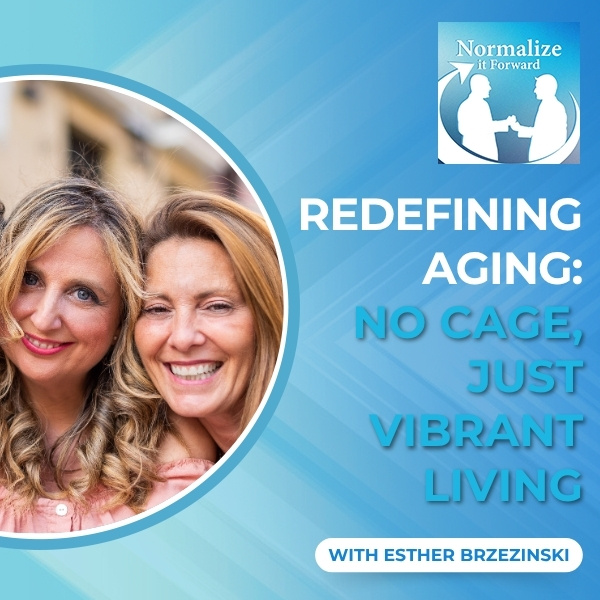
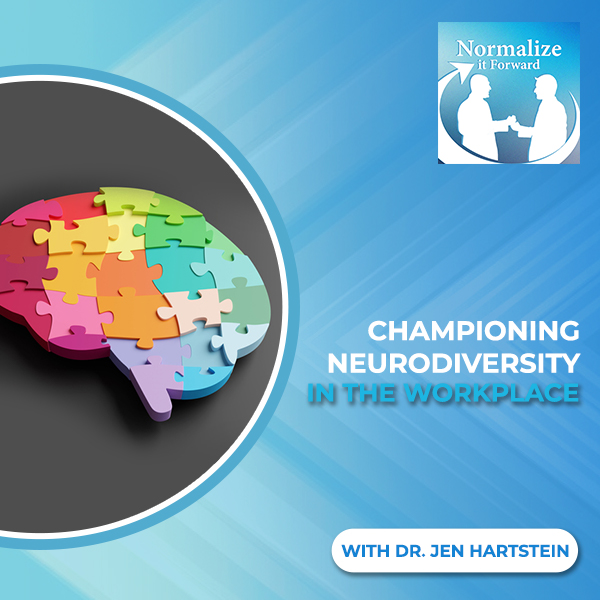
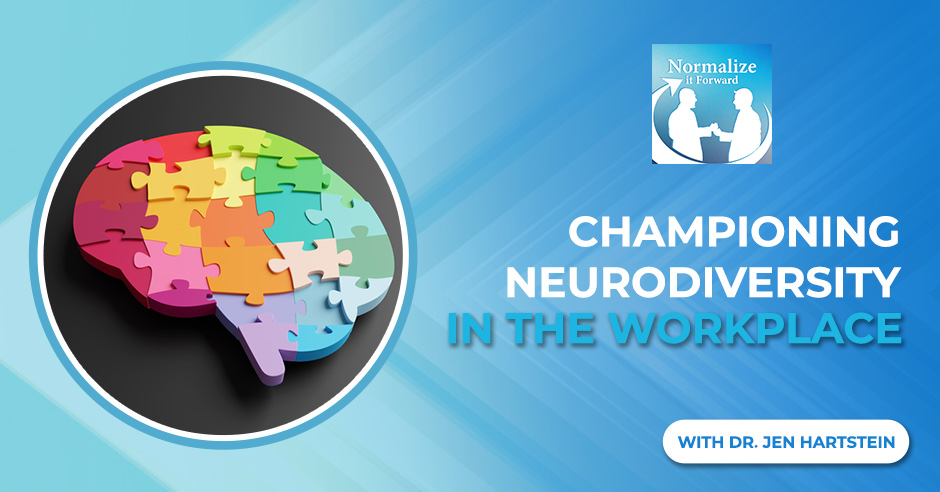
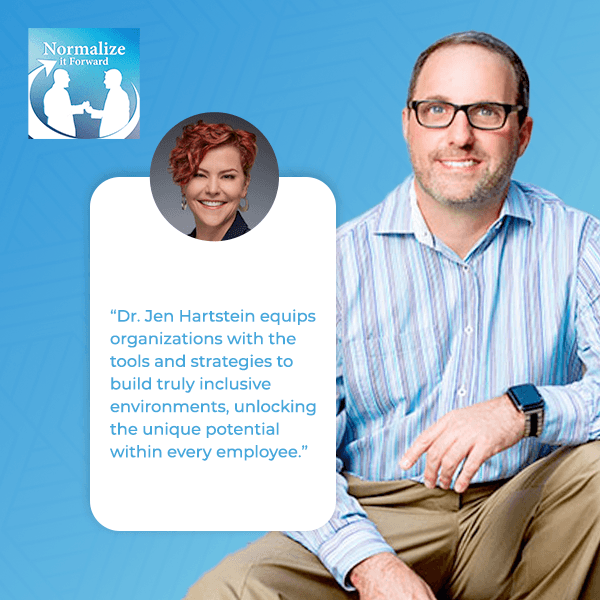
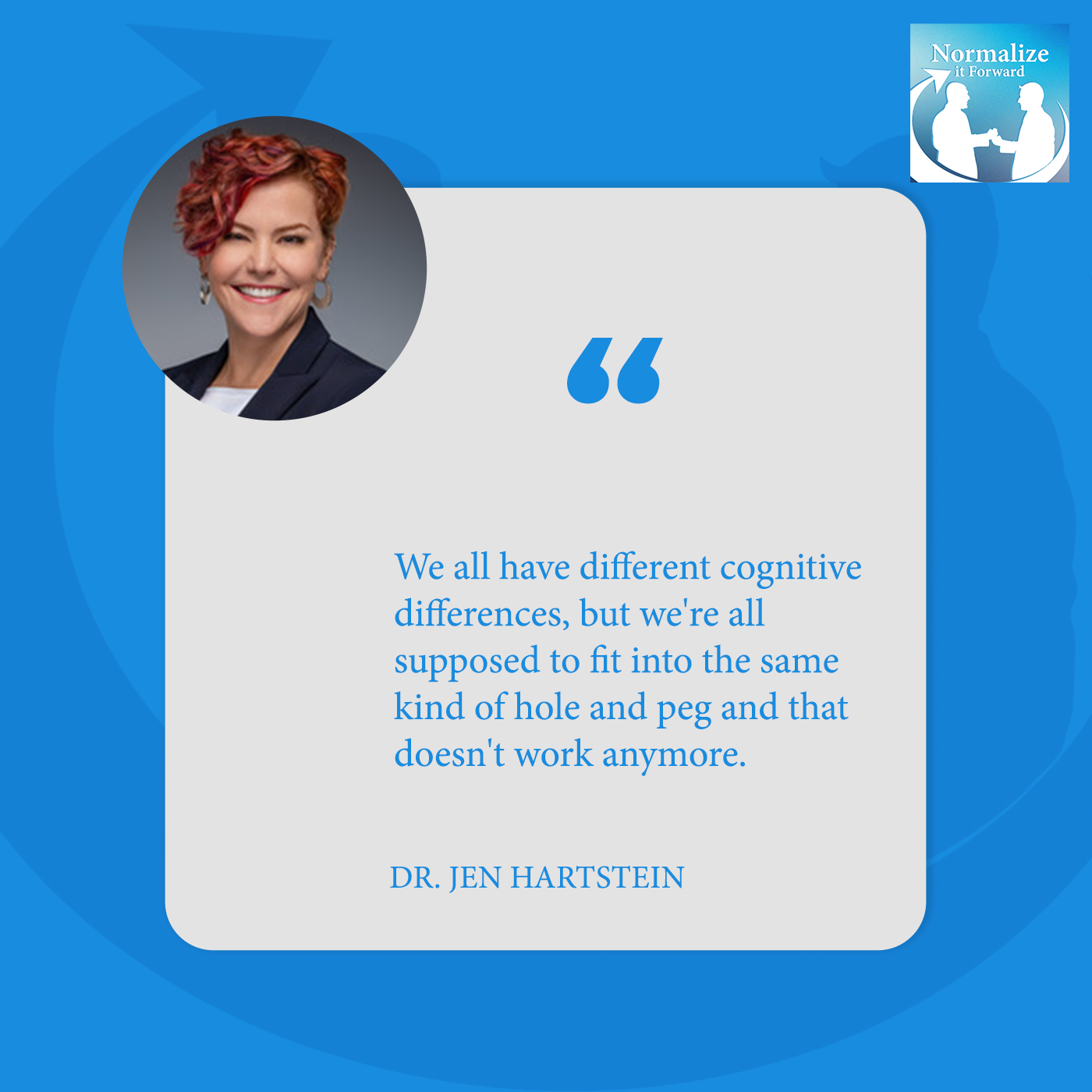
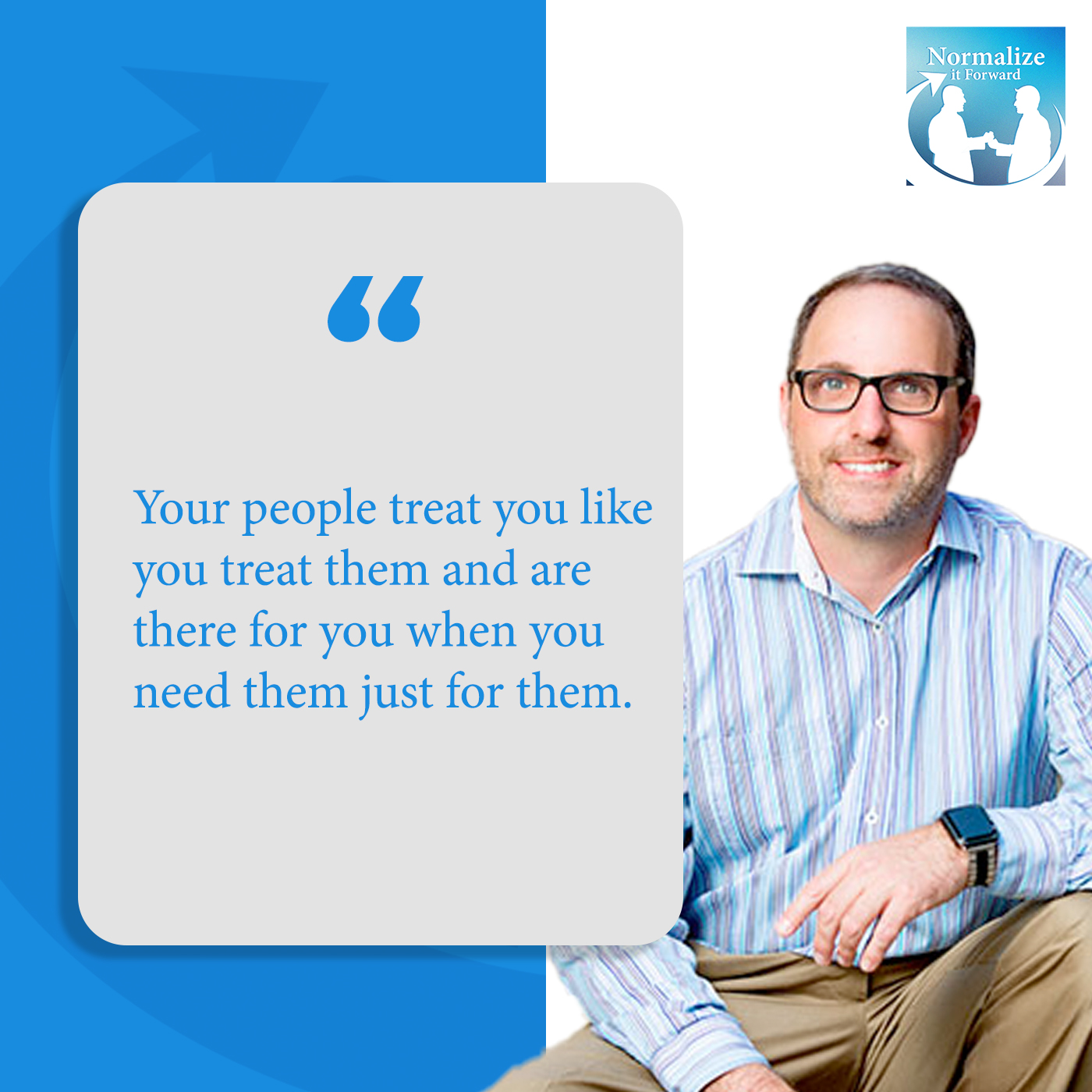
 Jennifer L. Hartstein, PsyD, is the owner of Hartstein Psychological Services, a group psychotherapy practice in New York City. Dr. Jen works with children, adolescents, and their families with a wide range of psychological diagnoses and specializes in the treatment of high-risk children and adolescents. She has received intensive training in adolescent suicide assessment and has specialized in this population for several years, using a variety of treatment approaches, including Dialectical Behavior Therapy.
Jennifer L. Hartstein, PsyD, is the owner of Hartstein Psychological Services, a group psychotherapy practice in New York City. Dr. Jen works with children, adolescents, and their families with a wide range of psychological diagnoses and specializes in the treatment of high-risk children and adolescents. She has received intensive training in adolescent suicide assessment and has specialized in this population for several years, using a variety of treatment approaches, including Dialectical Behavior Therapy.